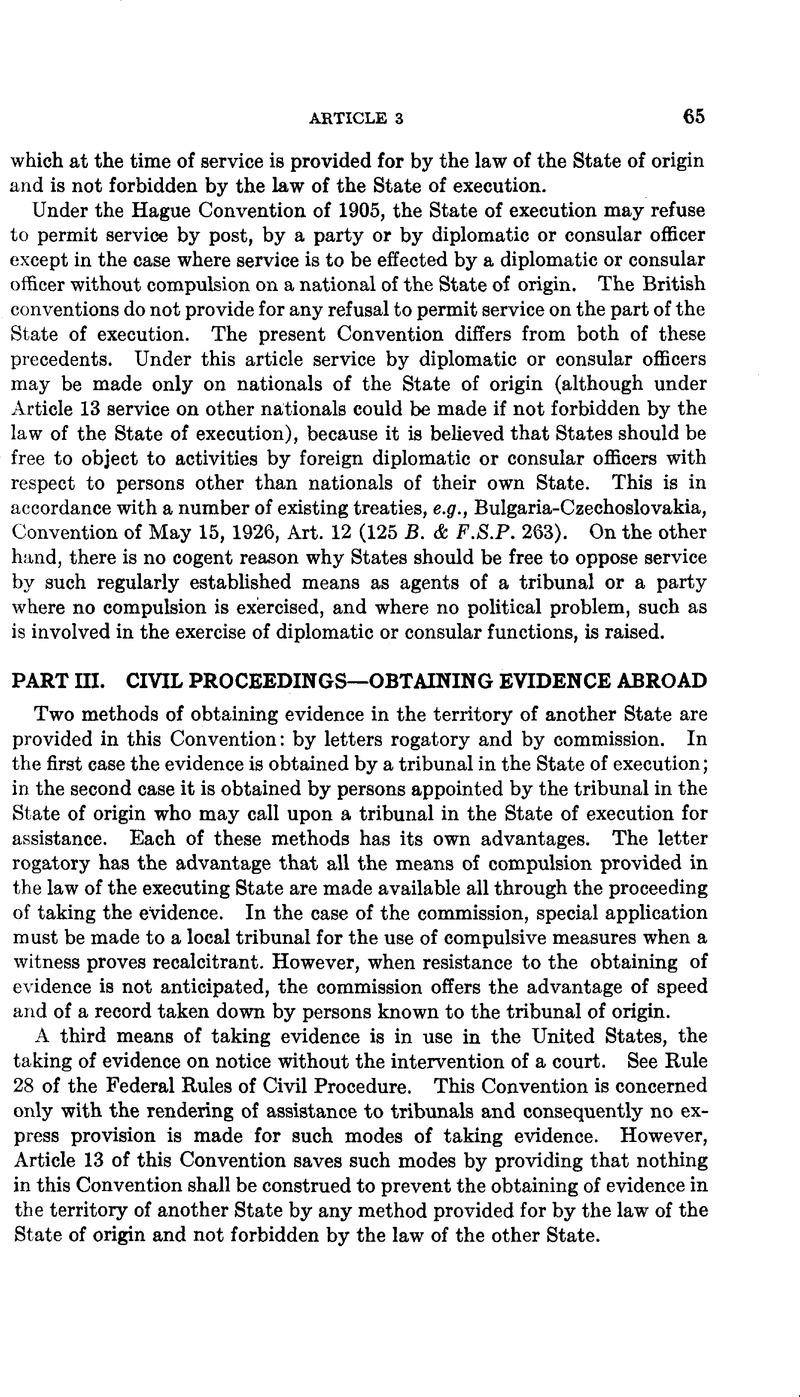No CrossRef data available.
Article contents
Part III. Civil Proceedings—Obtaining Evidence Abroad
Published online by Cambridge University Press: 12 April 2017
Abstract

- Type
- Part I: Judicial Assistance
- Information
- Copyright
- Copyright © American Society of International Law 1939
References
page 67 note 1 For an early instance of the issuance of a commission to take evidence abroad, in the absence of a statute, see Cunningham v. Otis, Fed. Cas. No. 3,485 (C.C. Mass. 1812).
page 68 note 1 The Federal practice is now governed by Rule 28 of the Federal Rules of Civil Procedure (1938), providing as follows:
Rule 28. Persons Before Whom Depositions May Be Taken.
(a) Within The United States. Within the United States or within a territory or insular possession subject to the dominion of the United States, depositions shall be taken before an officer authorized to administer oaths by the laws of the United States or of the place where the examination is held.
(b) In Foreign Countries. In a foreign state or country depositions shall be taken (1) on notice before a secretary of embassy or legation, consul general, consul, vice consul, or consular agent of the United States, or (2) before such person or officer as may be appointed by commission or under letters rogatory. A commission or letters rogatory shall be issued only when necessary or convenient, on application and notice, and on such terms and with such directions as are just and appropriate. Officers may be designated in notices or commissions either by name or descriptive title and letters rogatory may be addressed “To the Appropriate Judicial Authority in (here name the country).”
page 70 note 1 The present English law is otherwise. Under the Rules of the Supreme Court of Judicature, witnesses are to be examined viva voce, unless the parties stipulate otherwise. Order 37, Rule 1.
page 75 note 1 The Uniform Foreign Depositions Act is in force in the following jurisdictions: Alaska, Comp. Laws, 1933, §4242; Arizona, Revised Code, 1928, §4442; California, Code of Civil Procedure, 1937, §2036a; see also §§2035, 2036, cf. Christ v. Superior Ct., 211 Cal. 593, 296 Pac. 612 (1931), holding that mandamus will issue to compel a court to execute a letter rogatory since the court is without discretion under the statute to refuse execution; Louisiana, General Statutes, 1932, ch. 40; Maryland, Public General Laws, 1924, Art. 35• Michigan, Comp. Laws, 1929, §14240; Nevada, Comp. Laws, 1929, §9414; Pennsylvania, Statutes, 1930, Vol. 28, §§31-33; South Dakota, Comp. Laws, 1929, ch. 413, §2761-A; Tennessee, Williams’ Code, 1934, §9852; Wyoming, Revised Statutes, 1931, §§89-1901, 89-1903.
page 76 note 1 A possible reason why the Act of 1855 was overlooked is the fact that it was indexed in the statutes under “Mistrials.”
page 76 note 2 The Commissioner in Charge of the Revision stated with reference to this amendment: “I may say that that was a section of the statute of 1855, the second section of Chapter 140, which seems to have been omitted bodily, the whole of it. This is merely a reproduction of the second section of that statute.” Congressional Globe, Vol. 130, p. 530.
page 77 note 1 The Hague Convention and the British conventions expressly provide the execution of a letter rogatory may be refused if its authenticity is not established. The German-Soviet Agreement of Oct. 12, 1925, provides that in case of doubt as to authenticity, execution may be postponed until the doubt has been removed. Art. 9 (122 B. & F.S. J. 767).
page 80 note 1 Accord, that the executing court may not pass on competence or relevance of testimony: Butte & B. Consol. Min. Co. v. Montana Ore P. Co., 139 Fed. 843 (1905); Parisian Comb Co. v. Eschwege, 92 Fed. 721 (1899); Maxim Nordenfett Co. v. Colt’s Paient Firearms Co., 103 Fed. 39 (1900); Bliss v. Miãholland, 10 Pa. Dist. Rep. 201 (1901). Contra, that the executing court may pass on competence or relevance of testimony: Ex parte Peck, Fed. Cas. No. 10, 885 (1853); In re Judson, Fed. Cas. No. 7, 563 (1853); In re Allis, 44 Fed. 216 (1890).
page 80 note 2 Under R. S. §4071 (28 U.S.C. §701) a letter rogatory or commission will not be executed except “on due proof being made to (the) judge that the testimony of a witness is material to the party desiring the same.”
page 81 note 1 In Baron De Bildt, Petitioner, 7 Session Cases 899 (1905), letters rogatory were presented requesting that witnesses be examined before the sheriff-substitute at Dundee. Execution was refused because the Foreign Tribunals Evidence Act made no provision for examination of witnesses other than before a commissioner. Under this Convention, such a request would have to be granted.
page 85 note 1 See Executive Order of Oct. 15, 1936, amending Secs. 489 ff. of the Consular Regulations, 1 Federal Register 1624 (1936). The Consular Regulations now constitute Part II of the Foreign Service Regulations by virtue of the Executive Order of July 14, 1938, 3 Federal Register (D. I.) 1749.
page 85 note 2 General Instructions to His Majesty’s Consular Officers, ch. V, §§31-32, 1 Feller and Hudson, Diplomatic and Consular Laws and Regulations, p. 186 (1933).
page 86 note 1 It is significant that the text finally adopted omits the following sentence contained in the draft submitted to the Fourth Conference: “Cet État ne peut s’y opposer lorsque la mesure dont il s’agit doit être exécutée sans contrainte à l’égard d’un ressortissant de l’État requérant.” Actes de la quatrième Conférence de la Haye, p. 94.
page 89 note 1 A similar procedure is followed in the case of commissions issued by colonial courts, under the Evidence by Commission Acts, 1859 and 1885, 22 Vict, c. 20, 48 & 49 Vict, c. 74.


